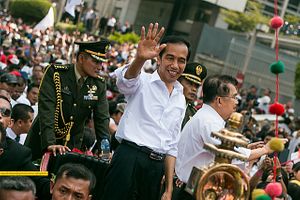On February 12, speaking to more than 100 Indonesian heads of missions in Jakarta, President Joko “Jokowi” Widodo said that Indonesia’s diplomacy must be adjusted in the light of new challenges. He added that the country’s diplomacy must be implemented in such a way that it reflects the reality that Indonesia is a great country — the only G20 member country from the Southeast Asia region. He also outlined many other pertinent foreign policy directives in his speech.
What is important from the president’s speech is not only its substance but also the way he delivered it. Jokowi engaged the audience with conviction and clarity, coupled with fresh wit. His speech’s tone signifies a remarkable increase in his mastery of diplomacy and foreign affairs — an area which posed great challenges and a steep learning curve at the beginning of his presidency.
Another important step from Jokowi is the inclusion of a maritime perspective as a core interest of his foreign policy. In addition, the president’s approach to diplomacy gives emphasis on tangible deliverables achieved through measured steps. The president attaches particular importance to both bilateral and multilateral diplomacy, including in the area of peace and stability.
The role of the presidency in Indonesian foreign policy is a subject that is rarely studied. Theoretically speaking, it can be understood by using, among others, Aaron Wildavsky’s concept of “The Two Presidencies” (1966). Although his study was set in the United States context, it can generally apply to other countries including Indonesia. Wildavsky argued that the United States has one president, but it has two presidencies: one presidency for domestic affairs, and the other concerned with defense and foreign policy.
Indonesia, since its formation as a modern nation-state, has been blessed by having figures as its heads of state and government that have capability, in their respective ways, to shape the country’s foreign policy. Within their respective domestic and external milieus, which carried with them unique challenges and opportunities, they navigated the country with stewardship and frequent use of diverse foreign policy instruments. Along the way, they injected the doctrinal zeal of policy and issued a series of directives that form the country’s foreign policy tradition and practices.
It began with President Sukarno, whose idiosyncrasies were molded by his deep contact with the realities of colonialism and the emergence and unfolding of the Cold War. Sukarno was an apt reader of the emerging spirit of the time. He knew very well regional and global circumstances that led to the war in the Pacific and how the war would end. He knew very well how to cope with and come up with alternatives to the evolving antagonism between the West and East blocs. He cleverly introduced a number of foreign policy innovations envisioning a new architecture of global politics, which include the Non-Aligned Movement (NAM).
Unlike Sukarno, it was only at a later stage that President Suharto was deeply involved in foreign affairs. Despite the fact that ASEAN was established in the early years of his presidency, the president’s affinity with diplomacy was strongest when Indonesia was chairing the NAM in 1992-1995. Under his presidency, Indonesia was able to build a collective view and response among the NAM member countries affirming the continuing validity and relevance of the movement when the Cold War was coming to an end. In his capacity as chair of the NAM, he revived the North-South dialogue and led a mission to Sarajevo to help find a solution to the conflict in Bosnia and Herzegovina.
As for President B.J. Habibie, from the early stage, his presidency tackled a series of difficult intermestic matters. Indonesia’s diplomacy during his presidency was primarily directed at finding a solution to the situation in East Timor. Another important contribution of his presidency was laying a strong foundation for robust human rights diplomacy. Through this diplomacy, Indonesia not only gained greater capacity in the promotion and protection of human rights at home but also paved the way for becoming a key player in the global human rights diplomacy.
Succeeding Habibie, President Abdurrahman Wahid, in almost two years of presidency, directed Indonesian foreign policy through a series of bilateral and multilateral initiatives. The president revived Indonesia’s relations and cooperation with many countries, and took part in the South Summit — G77 in Havana — as well as the Millennium Summit in New York. Another landmark initiative of his presidency was the founding of the Southwest Pacific Dialogue, which until today leverages Indonesia in the Southwest Pacific region.
In the following years, President Megawati Sukarnoputri highlighted the critical importance of regionalism with Indonesia serving as the ASEAN Chair in 2003. Indonesia’s leadership and chairmanship in ASEAN led to the endorsement of the Bali Concord II. This was a historic achievement that revolutionized ASEAN toward regional integration. The president also revived the spirit of the Bandung Asia-Africa Conference of 1955 with the launching of an Asian-African subregional cooperation initiative.
Beginning in 2004, President Susilo Bambang Yudhoyono took the lead of Indonesian foreign policy. Within a decade, under his presidency, the exercise of Indonesian diplomacy at the bilateral as well as multilateral levels was loaded with substantive and intellectual leadership, coupled with the insertion of pertinent doctrinal and pragmatic elements. This presidency largely invested in the building of a regional and global architecture of peace and stability as well as common prosperity. It often used diplomacy, including within ASEAN, APEC and G20, to internationalize Indonesian models such as the idea and policy of sustainable growth with equity.
In the coming years, the Indonesian presidency will continue to play a pivotal role in shaping the country’s diplomacy and foreign policy. No matter how little knowledge or experience one president has in the area of foreign affairs, he or she will sooner or later build a good grasp or even art and mastery of diplomacy and international relations.
Yayan GH Mulyana is a career diplomat with the Indonesian Ministry of Foreign Affairs. The ideas expressed are his alone.































